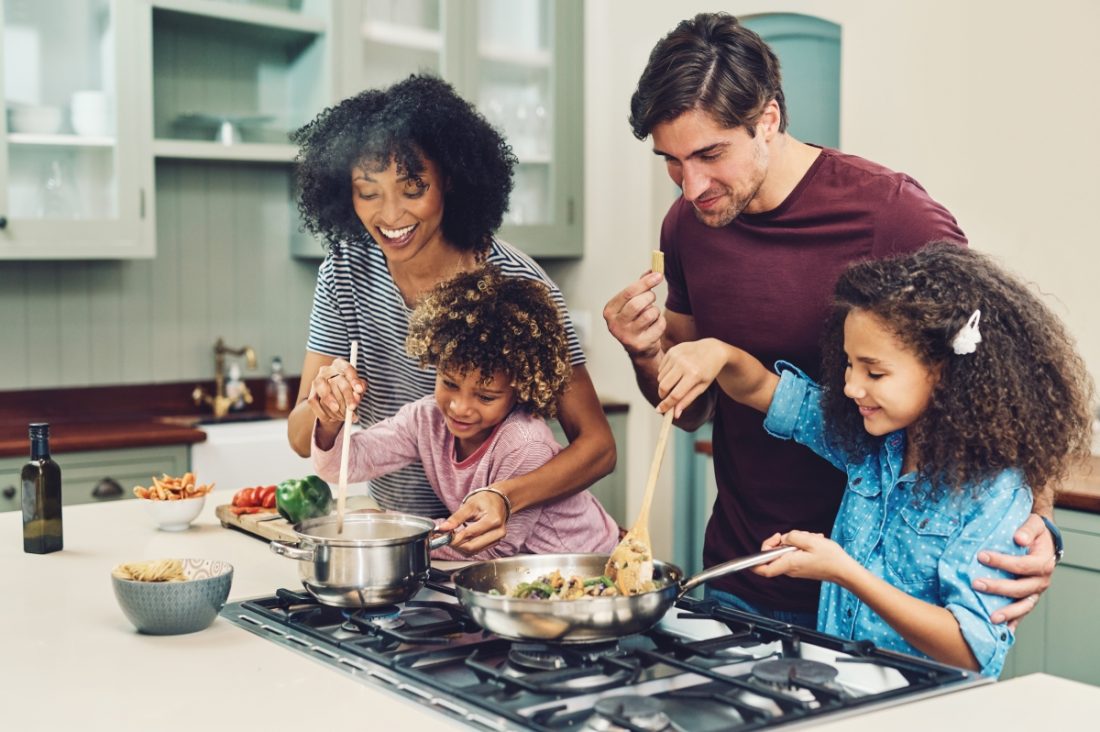This post is brought to you by Natalia Hughes.
The variety of smells, colors, and foods makes the kitchen a great place for young kids to discover. There are only so many questions that could be asked, and we all know children love to ask!
Even the older kids might be fascinated by the kitchen’s endless possibilities and resources. Often, after watching cooking shows on TV, or admiring parents preparing a meal for the guests, children want to become chefs themselves.
Mutual cooking is one of the greatest pastimes for parents and their kids, no matter the offspring’s age or sex. It is a time to educate children on how different foods are cooked, teach them secret recipes, and show useful skills.
As fantastic as it can be, cooking may have various risks for the kid. Putting their hands on the heated oven, breaking glassware, or climbing the kitchen counter unsecured are only some examples of the things that could go wrong.
To avoid unnecessary stress and worry, parents should always make sure that they know how to cook safely with their children before they start doing so. If you are a father or a mother looking for tips on preparing food with your kid securely, here is what you should know.
Choose the Right Dish and Adequate Tasks
Plan what dish you are going to prepare together carefully. The complexity of a meal should depend on the kid’s age and cooking skills.
Kids Aged Three to Seven
For younger kids, consider starting with simple dishes with fewer than five ingredients. Please make sure the foods you choose to prepare are easy enough to make for the kid by themselves. Only this way, they will learn and have a sense of achievement at the end of cooking.
Great examples of things you could make include homemade pizza, muffins made with bittersweet organic chocolate wafers, or a tossed salad.
Help your kid choose the ingredients and guide them through the cooking process step by step. At the same time, give them freedom and space for experimenting. Don’t get frustrated if the pizza is too spicy or the muffins are too sweet. The kid is learning, and that is what it is primarily about.
Kids Aged Seven to Fifteen
For older kids and teens, consider more complex dishes a great idea. While a 7-year old child may still enjoy making pizza, a 15-year old teenager might be bored with the recipe. Remember to choose the meals and tasks adequate to the kid’s age and expectations.
The best meals to prepare with an older offspring have their origins in foreign cuisines. Try making Italian pasta with tomato sauce, Chinese fried rice with chicken in the sour-sweet sauce, Norwegian roasted salmon, or even Japenese sushi, if your kid is a kitchen whizz.
Get Rid of the Sharp Stuff
Chances are you wouldn’t want to finish your parent-kid cooking session running to the hospital with a deep cut in your child’s hand. To avoid that horror scene scenario, make your kitchen a safe space free of any dangerous stuff.
Hide all the sharp knives, meat slicers or grinders, and cheese graters somewhere safe, where your kid won’t find them. This rule refers especially to younger children, who are known for their endless curiosity. Although it doesn’t seem reasonable for you, your kid won’t hesitate to check the blade’s sharpness on their hand.
It would also be best if you hid all the fire-related devices in your kitchen, to avoid the potential burning. No matter how reasonable it sounds, it is impossible to uninstall the gas oven for a couple of hours. Therefore, make sure you educate your kid well before you get down to mutual cooking.
Teach the child all about the potentially dangerous devices, their functions, and precaution methods. To make sure you and the kid are on the same page after your lecture, you can ask them concept checking questions about the various kitchen devices.
Set Time for Cleaning
Cleaning is almost as important as preparing the meal when it comes to cooking. It is merely a part of the process. Setting time for cleaning, you implement the excellent habit of cleaning after the work is done and teach your kid discipline.
Make sure you don’t let your child go and play before everything is cleaned and polished. The tableware should be in the dishwasher, the table should be free of any food scraps, and the kitchen counter should have no colorful stains on it.
Conclusion
Mutual cooking with offsprings is a fun activity for both you and your kids. It is a great chance to educate the younger kids on ingredients, and the older ones about more complicated recipes.
To avoid any unnecessary worries and unpleasant consequences of a cooking session, make sure you hide all the sharp kits and explain kitchen fire-based equipment’s functioning to the kid.
Moreover, pay attention to the tasks and recipes. Choose them adequately to the child’s age, preferences, and abilities.
On top of that, enjoy the process!



